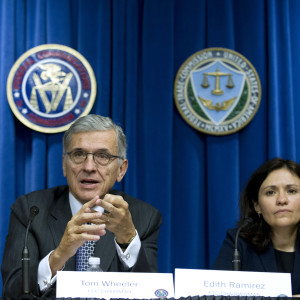The Federal Trade Commission lost its case in court this week to fine AT&T for throttling consumers’ data downloads, though it may be the privacy of consumer data that suffers most as a result.
That’s because AT&T’s defense, and the reason for siding with the carrier cited by the court, said the FTC can’t regulate a “common carrier” — a designation the Federal Communications Commission bestowed on AT&T and all other broadband internet service providers last year with its net neutrality order.
Before net neutrality, the FTC had jurisdiction over the internet ecosystem of internet providers like AT&T and content creators like Netflix. It used that authority to enforce transparency rules, like ensuring customers are notified when their data downloads reach a threshold at which they’ll automatically be slowed by the provider — the crux of the FTC’s case against AT&T.
The agency used the same authority to enforce privacy standards for how service providers and content creators can collect and use consumer data — standards the FCC, though it continues to work on, has yet to finish and vote on.
According to one expert, the result of Monday’s ruling in the U.S. Court of Appeals for the Ninth Circuit barring the FTC from regulating common carriers “may create a privacy vacuum” of enforcement online.
“At a minimum, this means the FCC will try to police what broadband companies do beyond providing broadband — especially privacy and data security,” Berin Szoka, president of TechFreedom, a center-right D.C-based policy think tank, said in a statement.
Szoka said that’s a problem because of an earlier case, brought by the pro-net neutrality group Public Knowledge, that found “the FCC’s authority ends with the act of communication — physical transmission.”
“So companies like Yahoo! and AOL, all based in the Ninth Circuit, may fall into a no man’s land of consumer protection, policed by neither agency,” he explained.
Verizon, now a common carrier under FCC authority, purchased AOL last year and inked a deal to buy Yahoo in July for $4.8 billion, efforts aimed at expanding its business as a service provider into digital content and advertising.
Earlier this month, FCC Chairman Tom Wheeler said the deal highlights the need for the FCC’s forthcoming privacy rules.
“I think it focuses on the importance of the privacy proceeding and addressing the questions that were raised in there as to what’s the appropriate use of network-generated information,” the chairman said after the agency’s August open meeting.
Despite Wheeler’s pledge the agencies will work together on enforcement of privacy and other non-common carrier issues, Monday’s ruling “proves the FCC wrong,” according to Szoka.
“Reclassifying broadband means the FTC can’t police any practices of common carriers, at least in the Ninth Circuit,” he added. “This is just another unintended consequence of the FCC’s 2015 reclassification of broadband.”
AT&T used the FCC’s reclassification to argue that as a common carrier under the net neutrality order adopted last February, it’s no longer subject to FTC jurisdiction. Though the original case tried in U.S. District Court for the Northern District of California sided with the FTC argument that AT&T is not exempt from enforcement for actions undertaken while it was overseen by the FTC, the Ninth Circuit overturned that ruling.
Szoka and others including past and present FTC commissioners say the best solution would be for Congress to get rid of the common carrier exemption barring the FTC from regulating common carriers.
“Removing the exception from the FTC Act would enable the FTC to bring its extensive law enforcement experience to bear in protecting consumers of common carriage services against unfair and deceptive practices in the same way that it can protect against unfair and deceptive practices for other services,” FTC Chairwoman Edith Ramirez testified to Congress in May.
Jon Leibowitz, a former FTC chair under Obama, agreed, but added privacy should be left to the FTC alone.
“You don’t need two different agencies doing this,” he said in July.
AT&T could still face a $100 million fine from the FCC for neglecting to notify customers with unlimited data plans they were subject to reduced download speeds if they exceeded 2 gigabytes in a single billing cycle. Between 2011 and 2014 the provider throttled data by as much as 90 percent for 3.5 million customers an average of 12 days out of every billing cycle, rendering certain applications like navigation unusable.

